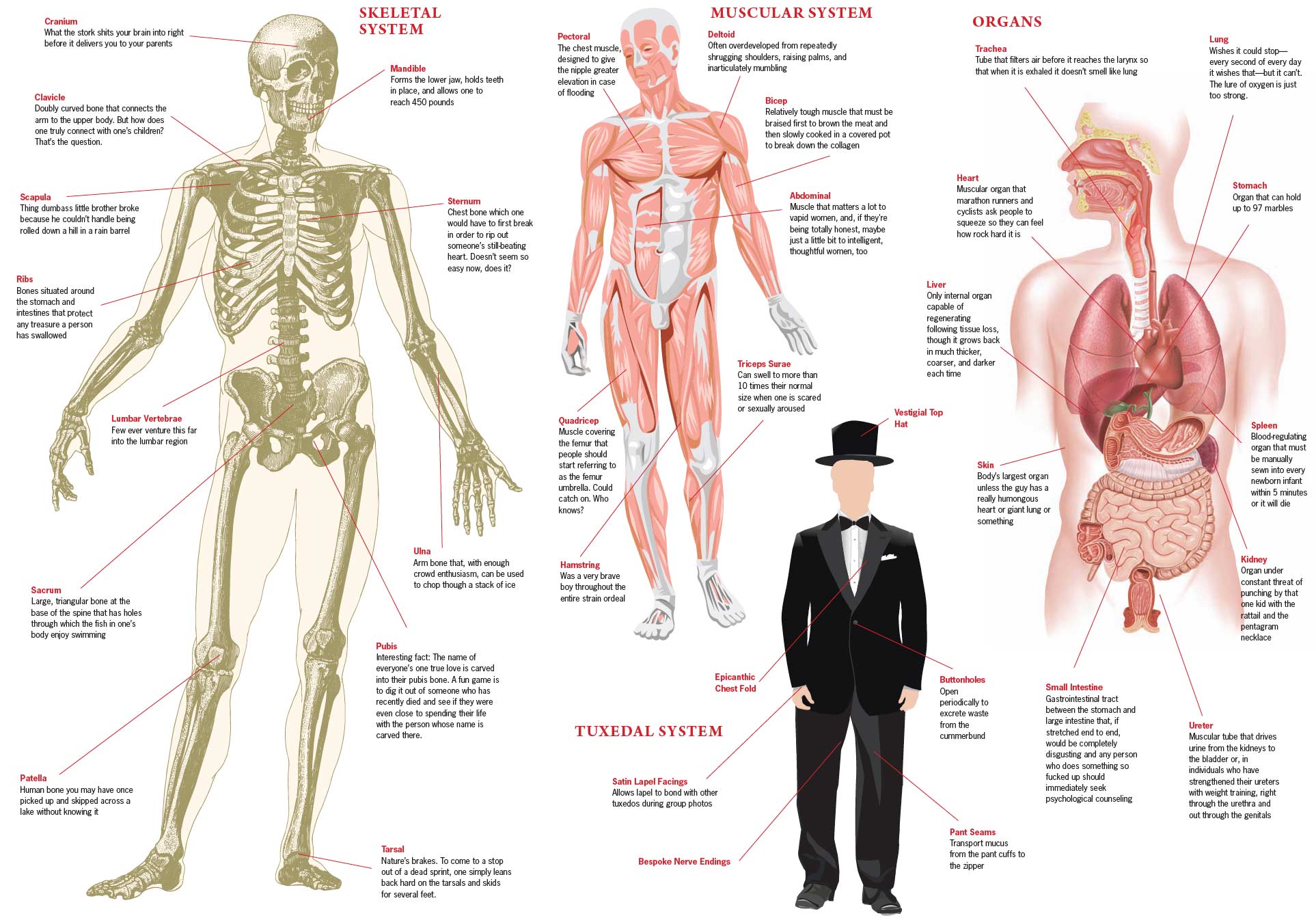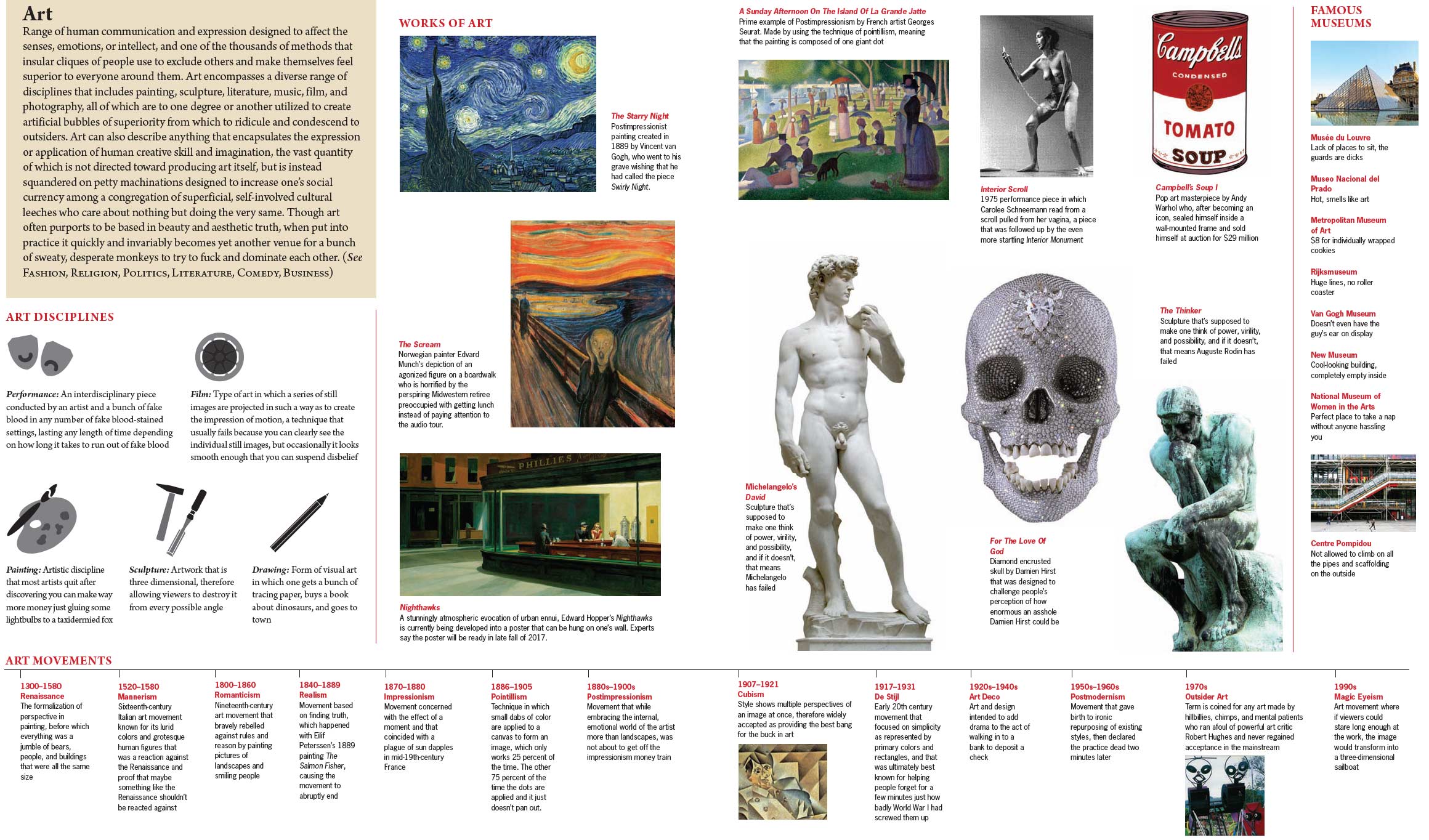Support justice-driven, accurate and transparent news — make a quick donation to Truthout today!
What would a better world be without humor? As a holiday special, Truthout is pleased to present the following excerpt to our readers. It is from the “The Onion Book of Known Knowledge.” Those who appreciate satire with a biting edge know “The Onion” as the top source for sardonic articles and ironic headlines. “The Onion Book of Known Knowledge” is just-released and available directly from Truthout with a minimum donation. Click here to order.
 Aa . α . Æ, first letter of the English alphabet and your last opportunity to come to terms with the fact that you hold in your hands the most important book in history and are about to embark upon an intellectual undertaking unlike any that has ever existed. The letter A represents your moment of truth, your last chance to ask yourself if you’re up to the demands of this volume and, if not, to have the integrity to place it back on the shelf and select a less challenging title or pursue an entirely different enterprise such as assembling a fun jigsaw puzzle. But if you possess the hunger, the discipline, and, yes, the courage required for this encyclopedia, then the letter A, a vowel with six different sounds, is your first step toward banishing ignorance once and for all.
Aa . α . Æ, first letter of the English alphabet and your last opportunity to come to terms with the fact that you hold in your hands the most important book in history and are about to embark upon an intellectual undertaking unlike any that has ever existed. The letter A represents your moment of truth, your last chance to ask yourself if you’re up to the demands of this volume and, if not, to have the integrity to place it back on the shelf and select a less challenging title or pursue an entirely different enterprise such as assembling a fun jigsaw puzzle. But if you possess the hunger, the discipline, and, yes, the courage required for this encyclopedia, then the letter A, a vowel with six different sounds, is your first step toward banishing ignorance once and for all.
Aapanthera, previously unknown breed of African big cat that, by 2012, had eaten all of the world’s aardvarks and taken their place at the top of every alphabetically organized list.
 Abacus, beaded manual counting device invented by ancient Sumerians to screw customers out of a fair price.Abdul-Jabbar, Kareem (b. Apr. 16, 1947), American basketball legend born Ferdinand Lewis “Lew” Alcindor, Jr., who was forced to change his name after Milwaukee Bucks coach Larry Costello imposed a strict code of Islamic law on his team. Issuing threats of severe physical punishment, Costello commanded Abdul- Jabbar and his teammates to wash their feet before stepping onto the court, grow thick beards in reverent emulation of the holy prophet Muhammad, and eat, drink, and dribble with their right hands in accordance with the immutable will of Allah. Despite Costello’s insistence that the Bucks exhaust valuable timeouts to pray toward Mecca, Abdul-Jabbar, along with veteran point guard Faruq Akbar and small forward Abdullah Ali-Abdullah (born Oscar Robertson and Bob Dandridge, respectively), led the team to its only championship in 1971. Abdul-Jabbar was banished from Milwaukee in 1975 after Costello caught him paying interest on a loan and, infuriated, threw acid in the 7-foot-2 center’s face, forcing him to wear protective goggles for the remainder of his career.
Abacus, beaded manual counting device invented by ancient Sumerians to screw customers out of a fair price.Abdul-Jabbar, Kareem (b. Apr. 16, 1947), American basketball legend born Ferdinand Lewis “Lew” Alcindor, Jr., who was forced to change his name after Milwaukee Bucks coach Larry Costello imposed a strict code of Islamic law on his team. Issuing threats of severe physical punishment, Costello commanded Abdul- Jabbar and his teammates to wash their feet before stepping onto the court, grow thick beards in reverent emulation of the holy prophet Muhammad, and eat, drink, and dribble with their right hands in accordance with the immutable will of Allah. Despite Costello’s insistence that the Bucks exhaust valuable timeouts to pray toward Mecca, Abdul-Jabbar, along with veteran point guard Faruq Akbar and small forward Abdullah Ali-Abdullah (born Oscar Robertson and Bob Dandridge, respectively), led the team to its only championship in 1971. Abdul-Jabbar was banished from Milwaukee in 1975 after Costello caught him paying interest on a loan and, infuriated, threw acid in the 7-foot-2 center’s face, forcing him to wear protective goggles for the remainder of his career.
Academy Award, film industry’s highest honor, given annually to actors, directors, and other professionals for excellence in the field of desperately wanting an Academy Award. The American Academy of Motion Picture Arts and Sciences has recognized the relentless desire for an Oscar since 1929 and has presented hundreds of awards to those who best exemplify the organization’s standards of naked ambition. The Oscars are preceded each year by the Golden Globes, which are also awarded to those actors who most want to win an Oscar.
Acorn, surveillance device manufactured by the government that is constantly monitoring everything we say.

Acupuncture, ancient Chinese system whose practitioners compete to see how many tiny needles they can insert into a patient’s skin before they are asked just what the fuck is going on here. The current record is 827,908.
Adam And Eve, according to the Book of Genesis, first man and woman created by God, and the last humans made personally by the Almighty Himself until 1976, when He made La Porte, Indiana, resident Jerry Dunnigan out of clay just to see if He could still do it.
SECOND, FIRST, AND 138TH PRESIDENT
John Adams (b. Oct. 30, 1735 d. July 4, 1826), erroneously considered the second U.S. president, Adams, because of the nonlinear way in which time was organized in the 18th century, was technically president before Washington. As a result of the complex pre-1800 nonconsecutive system of time, Adams was in many ways the nation’s first commander in chief, as well as its 19th and 64th, the first and 72nd vice president, Indiana’s fourthlargest Hyundai dealer, the man who gave a majestic eulogy at the funeral of President John Adams in 1826, and backup quarterback for the Los Angeles Rams from 2021 to 2026. As president, Adams retained Washington’s cabinet, though its members weren’t certain if they had served Washington first or if Adams had appointed them, but it was nevertheless seen as a gracious act of statesmanship. Unfortunately, when Washington was voted into office four years earlier, he spent the first part of his term undoing everything Adams would later achieve.
PET PEEVE
Was often mistaken for a hungry baby bird by mother starlings and force-fed worms
HOBBY
Perusing fabric stores for perfect hair ribbon
NICKNAME
John John John
ACCOMPLISHMENTS
Built up U.S. Navy by acquiring 200 oars
OF NOTE
From birth to death, always had a little mud on his body
AN AMERICAN FORESON
John Quincy Adams (b. July 11, 1767 d. Feb. 23, 1848), sixth U.S. president and the first American to fail to make a better life for himself than his father. After receiving a Harvard education almost identical to that of his father, John Adams, and practicing law to less renown, Adams became a much less distinguished president than his father, and his performance after holding the office was also less impressive, making him the only U.S. citizen up to that point in history who was not able to improve upon his parents’ lot in life in any way, shape, or form. John Quincy Adams died in 1848 at the age of 80, living a full 10 years less than his father did.
Addiction, physical or psychological dependence on something such as, well, in this particular case it’s alcohol, but it could come in many other forms as well. Addiction is sometimes focused on abstract concepts rather than actual chemical substances—obviously not what’s happening here with all the bingedrinking and the constant sipping from a flask and so forth, but it does happen—and patterns of addiction can differ greatly in their intensity, though in this instance, of course, we’re clearly talking about someone who pretty much needs a liter and a half of Gordon’s every day just to be able to function. Treatment for addiction can take many forms, including detoxification, therapy, and support groups, with varying degrees of efficacy, none of which matter if you can’t even get to the stage of admitting there’s a problem, and, clearly, there is.
Adoption, practice of raising some child nobody in the entire world wanted by pretending to be its parents. The adoption process requires extensive background checks and legal paperwork, allowing prospective parents numerous opportunities to back out and lead a fulfilling life without being dragged down by a kid who must have something wrong with them, and whom they could honestly never love as much as their own biological offspring.
Adulthood, period following adolescence in which one has figured out in explicit detail exactly what one wants do with one’s life, is always in control of every situation, and consistently takes the appropriate actions to realize that which is necessary to bring about a lifetime of happiness and personal fulfillment.
Advertising, vile method of communication aimed at persuading people to purchase products or services and responsible for the destruction of art and creativity itself, though those Nike ones are pretty. Advertising has become the dominant driver of content in print, film, and television, and it exerts a deleterious influence on the subject matter and quality of the media consumed, even if the Bud Light ads are usually funny. Though getting that Maxwell House jingle stuck in your head is annoying, it’s probably not the worst thing in the world, and to be honest, that goofy Geico lizard does kind of grow on you after a while.
Affection, emotional sensation that one either gets too much of and freaks out or gets too little of and freaks out.
Agriculture, cultivation of animals and plants to sustain life, and a landmark human achievement in that it created a sedentary lifestyle that allows a complete shut-in like you to exist today. Prior to the raising of crops and livestock for mass consumption, an introverted, emotional cripple such as yourself had to get over his little neuroses and either enter a communal, hunter-gatherer situation or starve to death. Because of the discovery of agriculture in ancient Sumer more than 10,000 years ago, you can now stay in your pajamas in your dimly lit apartment, play online poker all day, and call a restaurant to bring you food because being around other people makes you feel uncomfortable and awkward and basically act like a 4-year-old. Agriculture accounts for nearly a third of the world’s economy, creating enough well-adjusted people out there who are willing to help a civilization of fragile, withdrawn individuals, who can’t even go to the grocery store without having a goddamn panic attack, thrive. Jesus Christ, grow up.
Air, atmospheric gas that celebrities must share with regular people.
Airplane, fixed-wing flying vehicle invented in 1903 that has made it impossible to avoid returning home for Christmas, Thanksgiving, weddings, funerals, or any other event, no matter how far away it is. Airplanes counter the force of gravity by using either static lift or the dynamic lift of an airfoil, which completely eliminates any excuse one might have not to travel 1,500 miles for Labor Day weekend even though they were just home for the Fourth of July and really would like to take an actual vacation for themselves one of these days. The ability of the airplane to safely and swiftly cover large distances has allowed millions to fly all the way in from San Diego for Mother’s Day, which isn’t even a major holiday, or attend their sister’s baby shower when everyone knows there’s no fucking way she’d do the same for them. No fucking way.
Alamo, Roman Catholic mission in San Antonio, Texas, where in 1836 a small group of brave Americans selflessly laid down their lives against a much larger Mexican army to preserve their freedom to own other human beings as slaves. When the Mexican government brazenly outlawed the practice of involuntary servitude in the region of Texas under its rule, volunteers from across America flocked to the Alamo to defend—to the death if necessary—the proud national tradition of possessing men, women, and children. At the end of a 13-day siege, General Antonio López de Santa Anna launched a final assault before dawn on March 6, ultimately overwhelming the gallant Alamo defenders, who are now immortalized as heroes for sacrificing themselves so that others might live as pro perty. The Alamo is the most popular tourist destination in Texas.
 Alcatraz, island prison that was impossible to escape until inmates discovered a free ferry to San Francisco that departed every half hour.Alexander the Great (b. July 20 or 21, 356 bc d. June 10 or 11, 323 bc), prodigious leader, diplomat, and military tactician who by the age of 30 had almost as much power and wealth as Facebook founder Mark Zuckerberg had when he was 25. Following his father’s assassination, a young Alexander ascended to the throne and, as general of the Greek army, led a conquest that gave him control over an empire of 10 to 13 million people and made him the world’s richest and most powerful individual, nearly as rich and powerful, in fact, as the Mark Zuckerberg of 2010, who made $20 billion and gained access to the personal information of 800 million active Facebook users just by sitting in front of a computer screen for a few years. Alexander the Great died at the age of 32, leaving behind a rich legacy that equals about one-fifth the significance and influence of Zuckerberg, who will almost certainly live for another six or seven decades.
Alcatraz, island prison that was impossible to escape until inmates discovered a free ferry to San Francisco that departed every half hour.Alexander the Great (b. July 20 or 21, 356 bc d. June 10 or 11, 323 bc), prodigious leader, diplomat, and military tactician who by the age of 30 had almost as much power and wealth as Facebook founder Mark Zuckerberg had when he was 25. Following his father’s assassination, a young Alexander ascended to the throne and, as general of the Greek army, led a conquest that gave him control over an empire of 10 to 13 million people and made him the world’s richest and most powerful individual, nearly as rich and powerful, in fact, as the Mark Zuckerberg of 2010, who made $20 billion and gained access to the personal information of 800 million active Facebook users just by sitting in front of a computer screen for a few years. Alexander the Great died at the age of 32, leaving behind a rich legacy that equals about one-fifth the significance and influence of Zuckerberg, who will almost certainly live for another six or seven decades.
 Alcohol – Scientists are still unsure how this compound transmutes bus station benches into convenient toilets.Alcohol, organic compound that can transform any physical surface into a bed, toilet, or, when consumed in high enough volumes, both. Through a complex chemical process, alcohol is able to change a concrete parking lot into a featherdown king-sized mattress or a hall closet into a fully functional bathroom with working commode. Alcohol in its various forms has additional transformative properties, including the ability to change garbled, incoherent ramblings into valid arguments and to initiate a subtle process by which members of the same sex are metamorphosed over the course of an evening into members of the opposite sex. It is not currently understood, however, why no amount of alcohol has been able to change the way things ended with Dad.
Alcohol – Scientists are still unsure how this compound transmutes bus station benches into convenient toilets.Alcohol, organic compound that can transform any physical surface into a bed, toilet, or, when consumed in high enough volumes, both. Through a complex chemical process, alcohol is able to change a concrete parking lot into a featherdown king-sized mattress or a hall closet into a fully functional bathroom with working commode. Alcohol in its various forms has additional transformative properties, including the ability to change garbled, incoherent ramblings into valid arguments and to initiate a subtle process by which members of the same sex are metamorphosed over the course of an evening into members of the opposite sex. It is not currently understood, however, why no amount of alcohol has been able to change the way things ended with Dad.
Alcott, Louisa May (b. Nov. 29, 1832 d. Mar. 6, 1888), Civil War nurse and novelist who wrote Little Women, a graphic, semiautobiographical account of the hundreds of grotesque battlefield amputations she performed in the waning days of the conflict. The story follows Josephine “Jo” March Bhaer and two fellow nurses as they race to remove the badly crushed and gangrenous limbs of sobbing Union soldiers who have been rushed to field hospitals, many of them with blood still gushing in crimson torrents from their open wounds. Exhausted and covered in infected pus, flesh, and sinew, the three women bond over jamming spent munitions into soldiers’ mouths before frantically sawing off their arms or legs without anesthesia, and then, years later, over trying to drown out the shrill cries of ag ony that continue to haunt their dreams. Alcott’s classic novel is still beloved by women around the world and has been adapted into several stomach-turning, almost unwatchable feature-length films.
Aldrin, Buzz (b. Jan. 20, 1930), American astronaut and second man to shit his pants on the moon.
Ali, Muhammad (b. Jan. 17, 1942), once-legendary boxer who dominated the sport for a decade but has gone 0-32 since his last victory in 1978. Despite claiming the championship in 1964, 1974, and 1975, Ali suffered a steady decline in his speed and footwork throughout the 1990s and 2000s, tiring quickly and throwing labored, easily deflected punches with almost no power behind them whatsoever. Some of Ali’s most devastating defeats have included a first-round knockout at the hands of Larry Holmes in 1986, a first-round loss to Evander Holyfield in 1995 that the alarmed referee stopped six seconds into the bout, and a particularly brutal 2003 first-round loss to Lennox Lewis in which Ali crumpled to the canvas from the force of the opening glove tap. The closest Ali has come to a victory since the late ’70s was in 1996, when the 54-year-old lost a narrow split decision to Mike Tyson.
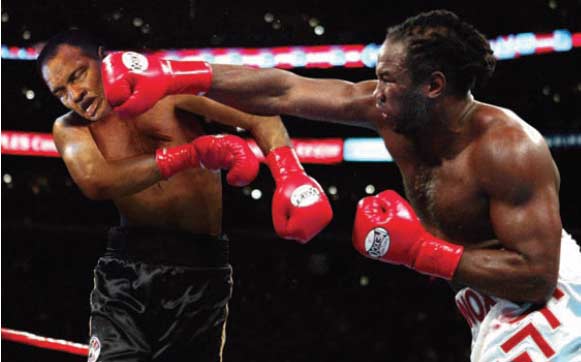 Ali still uses the rope-a-dope technique to wear down opponents by absorbing the energy of their punches with his face.
Ali still uses the rope-a-dope technique to wear down opponents by absorbing the energy of their punches with his face.Allen, Woody (b. Dec. 1, 1935), famed American comedian, writer, and filmmaker known for his insecure personality and highly neurotic mannerisms, such as obsessively making hit movie after hit movie, being very finicky about the scores of beautiful Hollywood actresses he’s dated, and worrying comically about whether he should write another Academy Award–winning screenplay, publish another piece in The New Yorker, or play another sold-out show with his acclaimed Dixieland jazz group.
Allergy, hypersensitive immune response to a foreign vector or allergen caused by childhood exposure to dust, pollen, Volvos, Montessori school, Burt’s Bees products, Mandarin lessons, the music of Paul Simon, PSAT tutors, and organic almond butter.
Almanac, type of novelty item, laughably referred to as a reference book, which compiles hundreds of pages of purportedly factual trifles about the stars and the weather in a blatant attempt to fool simpleminded book shoppers. Although many still live under the misapprehension that these centuries-old anthologies of lies serve some sort of practical purpose (See Mass Delusion), a majority of intelligent people agree that readers would be far better off consulting a more trusted, alphabetically organized reference volume, such as an encyclopedia, for all their information needs.
Alpha Male, sociological term for the male individual in a group with the most influence, generally typified by his ability to stroll right into a Mitsubishi dealer, tell the salesman he wants a fully loaded Eclipse for $17,500 and not a cent more, and drive out of there with the thing that afternoon. Achieved by physical dominance and unwillingness to settle for a sunset orange exterior when he knows damn well it’s no skin off the guy’s nose to give him one in kalapana black, his high-ranking status affords the alpha male first preference when it comes to food, mates, or getting the same deal his father-in-law got not three weeks ago. The alpha position can change hands, however, if the dominant male is threatened or challenged by another individual, such as a franchise manager who deploys the power move of making the alpha male wait outside his office for 15 minutes without offering him any coffee while he pretends to check with his regional supervisor.
Al-Qaeda, radical Islamist terrorist organization founded by Sunni extremist Osama bin Laden that gave the United States something to do. Formed in the late 1980s, when the United States was just sort of killing time and not really up to much, al-Qaeda steadily built up a network of militant operatives and, on Sept. 11, 2001, perpetrated a massive suicide mission on American soil that killed nearly 3,000 civilians, giving America something to keep itself busy with for at least the next couple decades. Since the events of 9/11, the United States—figuring that at least it had a project to focus on now so, you know, what the hell—has sought to root out members of al-Qaeda with Predator drone strikes and covert military operations, which, while they aren’t the most fun thing in the world for a country to do, are better than sitting around with its thumb up its ass.
Al-Zawahiri, Ayman (b. June 19, 1951), operational mastermind of the militant Islamist group al-Qaeda who made billions by registering the trademark “We Will Never Forget” and then licensing it for bumper stickers, T-shirts, and window decals two weeks before the the 9/11 attacks on the United States.
 Amazon Rain Forest – Scientists believe some of the Amazon Rain Forest’s machines could one day be used to uproot and destroy a cure for cancer.Amazon Rain Forest, vast, lush South American forest situated in the 1.7-billion-acre Amazon basin that hosts an astonishing diversity of diesel-powered skip loaders, dump trucks, road graders, and power shovels. Researchers have identified more than 30 different types of bulldozers alone, some of which are perfectly equipped with deep-treaded cleats ideal for ripping through the rich topsoil, while others have adapted to the forest with bladed pincers capable of tearing through trees at high rates of speed. The delicate interdependency of the huge machines in the Amazon is extremely intricate: Bulldozers help ensure road graders do not become mired in undergrowth; flatbed trucks are needed to haul away the enormous trees so bulldozers are not buried in lumber; and road graders make it possible for flatbed trucks to reach the bulldozers. Amazon deforestation remains a massive and dynamic system that has fascinated engineers and entrepreneurs alike for more than a century and may one day span the South American continent from coast to coast.
Amazon Rain Forest – Scientists believe some of the Amazon Rain Forest’s machines could one day be used to uproot and destroy a cure for cancer.Amazon Rain Forest, vast, lush South American forest situated in the 1.7-billion-acre Amazon basin that hosts an astonishing diversity of diesel-powered skip loaders, dump trucks, road graders, and power shovels. Researchers have identified more than 30 different types of bulldozers alone, some of which are perfectly equipped with deep-treaded cleats ideal for ripping through the rich topsoil, while others have adapted to the forest with bladed pincers capable of tearing through trees at high rates of speed. The delicate interdependency of the huge machines in the Amazon is extremely intricate: Bulldozers help ensure road graders do not become mired in undergrowth; flatbed trucks are needed to haul away the enormous trees so bulldozers are not buried in lumber; and road graders make it possible for flatbed trucks to reach the bulldozers. Amazon deforestation remains a massive and dynamic system that has fascinated engineers and entrepreneurs alike for more than a century and may one day span the South American continent from coast to coast.
Amazon River, South American waterway surrendered to piranhas by the Brazilian government in exchange for the species’ promise never to venture onto land. Alarmed by shore encroachments indicating the flesh-eating fish might soon emerge from the world’s largest river to attack human beings in their own homes, Brazilian officials agreed in 1971 to cede all authority over the river and its basin to the piranhas, including total sovereignty over some of the most diverse aquatic wildlife found on earth. Though most its 4,200-mile course travels through Brazil, the Amazon originates in Peru, which only relinquished its segment of the river when a school of piranhas crawled out from the water, made its way to the capital city of Lima, and skeletonized the prime minister in just under 30 seconds.
Ambulance, vehicle designed to safely transport the sick or injured to the nearest dumpster.
American Civil War (1861– ), ongoing conflict between the northern and southern regions of the United States. Following the election of abolitionist president Abraham Lincoln in 1860, a group of pro-slavery states announced its intention to secede from the union and form the Confederate States of America, known today as “the Confederacy” or “the South.” The newly formed government asserted, and maintains to this day, that federal authority is subordinate to that of states and is a threat to the economy, security, and culture of the South. Actual fighting began in 1861 when the Confederates attacked a U.S. military outpost at Fort Sumter in South Carolina, the first in a series of continuous hostilities that would include the First and Second Battles of Bull Run, the Battle of Antietam, General Sherman’s brutal March to the Sea, Jim Crow laws, Martin Luther King, Jr., the assassination of Martin Luther King, Jr., the Brady Bill, the Blue Collar Comedy Tour, Ivy League assholes, Wal-Mart, Wall Street, and the elections of George W. Bush and Barack Obama. The conflict is the deadliest ever fought on American soil, with more than 120 million casualties recorded to date and many more expected from the fighting currently taking place in Congress—by far the most ferocious combat since the Civil War began. In fact, historians believe that both the North and the South are even more committed to total victory today than they were when the first shots were fired, and that the bloodiest battles of the conflict have yet to occur.
 Clockwise from top left: Troops prepare for combat; the Battle of Montgomery; two leading figures in the ongoing propaganda war; Confederate forces descend on Washington.
Clockwise from top left: Troops prepare for combat; the Battle of Montgomery; two leading figures in the ongoing propaganda war; Confederate forces descend on Washington.
Amoeba, simple one-celled organism whose primary form of locomotion, blindly bumping into objects in search of food, is emulated by roughly four-fifths of the world’s human population.
CITIES OF THE WORLD Amsterdam boasts beautiful canals, stunning architecture, fucking, and world-class museums.Amsterdam – Most populous city in the Netherlands, famous for its balance of old-world and modern architecture, vast canal system, hard-core fucking, and colorful festivals. Settled in the 13th century as a fishing village, the city quickly grew into a center of commerce and intercourse, where international goods were traded, intellectual ideas were shared, and weirdo pervs could get sucked off by a wildeyed Egyptian nymph for half a guilder. Modern Amsterdam is among Europe’s most progressive cities, leading in such fields as design, fisting, felching, civil engineering, fashion, five-ways, pony play, computer science, and transportation. Its stock exchange is the oldest in Europe, and lovely Anastasia takes six men at once while shitting into a crystal goblet during her live show on the Bloedstraat at 11:30 p.m. every Tuesday. Amsterdam’s average annual temperature is 13.4 degrees Celsius (56.1 Fahrenheit).
Amsterdam boasts beautiful canals, stunning architecture, fucking, and world-class museums.Amsterdam – Most populous city in the Netherlands, famous for its balance of old-world and modern architecture, vast canal system, hard-core fucking, and colorful festivals. Settled in the 13th century as a fishing village, the city quickly grew into a center of commerce and intercourse, where international goods were traded, intellectual ideas were shared, and weirdo pervs could get sucked off by a wildeyed Egyptian nymph for half a guilder. Modern Amsterdam is among Europe’s most progressive cities, leading in such fields as design, fisting, felching, civil engineering, fashion, five-ways, pony play, computer science, and transportation. Its stock exchange is the oldest in Europe, and lovely Anastasia takes six men at once while shitting into a crystal goblet during her live show on the Bloedstraat at 11:30 p.m. every Tuesday. Amsterdam’s average annual temperature is 13.4 degrees Celsius (56.1 Fahrenheit).
Anatomy
Branch of science concerned with the bodily structure of living things that is increasingly difficult to pursue due to the fact that nearly every organism on earth has been riddled with bullets. Anatomy generally involves the separation and dissection of an organism’s different parts, tasks that are now all but impossible considering any plant or animal a researcher studies is likely to have had most of its biological systems reduced to undifferentiated pulp in a hail of gunfire. Because even the smallest single-celled amoeba has, at this point, been at least winged by a bullet, anatomy is now more or less a pointless science, as it is impossible to gather useful physical data from a blue whale or giant redwood tree that has been blasted to pieces by a howitzer round. Further hindering the field of anatomy is the routine discovery of underwater ecosystems containing never-before-studied coral formations that have had their entire populations systematically lined up and shot execution-style with hollow-point .38 slugs, scattering these creatures’ various forms of central nervous systems all over the seafloor. In addition to finding that most mammal specimens have been reduced to indistinguishable mush-piles of bones, fur, teeth, and antlers by high-caliber bullets before they can be collected for study, many researchers are forced to abandon anatomy after they themselves are shot multiple times at point-blank range.
Anatomy – Click here to view full size in new window.
Anesthesia, drugs or gases administered to eliminate the feeling of pain during an operation, after which the patient is permitted to take home any leftover anesthesia that was not used in the procedure.
Anger, negative emotion that only people in charge are allowed to express. An automatic psychological response, anger is off-limits to all but those who rank above you, though it is sometimes permissible among assistants to people in charge when conveyed on their behalf. Any outright display of anger, including physical or emotional outbursts of aggression, by anyone else will only lead to a furious response from the person in charge.
Antelope, another fucking kind of deer.
Antietam, Battle Of, Civil War battle and single bloodiest day in U.S. history, cut short after rival generals Robert E. Lee and George B. McClellan deduced that, with so many casualties on both sides and no clear-cut winner, they must be fighting all wrong. Launching assaults in Sharpsburg, Maryland, and Antietam Creek in 1862, both generals sensed they must have been making some major tactical and strategic blunders after infantrymen not only started dying, but also began losing limbs, screaming in intense agony, and doing nothing whatsoever that could be construed as seizing victory or advancing the larger political goals of their side. As a result, Union and Confederate forces agreed to stop the fighting halfway through in order to regroup and make sure everyone was on the same page in terms of what a battle was and whether or not they were doing it right. When combat continued, 1,500 more people died almost immediately, leading McClellan and Lee to apologize and agree to fight again when their troops were better trained.
Anxiety, state of constant fear and apprehension experienced by reasonable, clearheaded individuals who understand that the future is fraught with constant setbacks and stresses, as well as physical and emotional pain. Characterized by the ability to think realistically about terrible and unavoidable matters such as the inevitable loss of a loved one, financial woes, the inadequacy one will feel during an upcoming sexual encounter, the fact that one’s career and marriage are headed nowhere, the all-too-real possibility of being diagnosed with stage III pancreatic cancer during what was supposed to be a routine checkup, how awful moving to a new town will be, an upcoming visit from one’s parents, and tomorrow being just as bad as today, anxiety afflicts anyone who is both sane and alive. People who do not experience intense, crippling anxiety on a daily basis and aren’t living in constant dread of the future are considered mentally ill and should seek professional help.
Apartheid, government-sanctioned racial segregation in South Africa and the last place somebody could go to enjoy the simple pleasure of drinking from a “whites only” water fountain. Until 1994, when apartheid was outlawed, anyone who desired to dine in a “whites only” restaurant, ride on a “whites only” bus, or relax in the “whites only” section of a public beach, could do so by flying to the southernmost country in Africa, a long and inconvenient trip, but a perfect way to sample the fruits of institutional racism.
Apartment, place where one lives while one looks for a new apartment.
Apology, spoken or written contrition that accounts for 50 percent of human conversation.
Appalachian Trail, 2,180-mile-long path along the Eastern Seaboard of the United States that is the worst, least efficient way to travel from Georgia to Maine. Traversed each year by those who willingly deny the existence of America’s vast transportation system for some inexplicable reason, the Appalachian Trail takes roughly four months to hike but can be covered in two days by car, 26 hours by rail, or five hours by plane—three fully air-conditioned means of conveyance that offer zero chance of getting bitten by mosquitoes, spraining an ankle, or going weeks without bathing. If one absolutely must walk from Springer Mountain to Mount Katahdin, a far more sensible choice would be to use Interstate 95: It’s a straight shot, and there are plenty of stores and hotels along the way so that one doesn’t have to travel across 14 states while carrying 50 pounds of gear. Overall, hiking the Appalachian Trail offers nothing but the chance to grow a mangy beard and waste time. It literally defies logic.
Apple, nutritious tree tumor.
Apple Inc., American electronics manufacturer that created the first computer any jerk could use. By marketing jerk-friendly desktop computers to schools and focusing on simple, stylishly designed devices with the average jerk in mind, Apple built a customer base of loyal jerks passionate about using its products at their jerk jobs. The company extended its reach beyond computers in the late 20th century and dominated the mobile jerk music industry with the iPod and iPhone, and created an entirely new market that jerks didn’t even know they needed with the introduction of the iPad tablet. The Apple brand has become an enduring status symbol to millions of supposedly tech-savvy jerks who couldn’t use an actual computer if their lives depended on it.
Appomattox Courthouse, building in Appomattox, Virginia, where on April 9, 1865, General Robert E. Lee surrendered to General Ulysses S. Grant, offering his hand to the Union commander for the customary slow dance to end the American Civil War. To the strains of “Two Soldiers,” performed by the Union Army Band, the two men—Lee’s arms resting on Grant’s shoulders; Grant’s wrapped around Lee’s hips—gracefully sashayed around the small wooden surrender table as members of both armies exchanged furtive glances from across the room. As the song drew to a close, Grant twirled Lee once, let him out an arm’s length, pulled him in tight, and dipped him to the floor, signaling the end of the four-year-long conflict and the beginning of the Reconstruction Era. Afterward, all in attendance were invited onto the dance floor to participate in a ceremonial waltz.
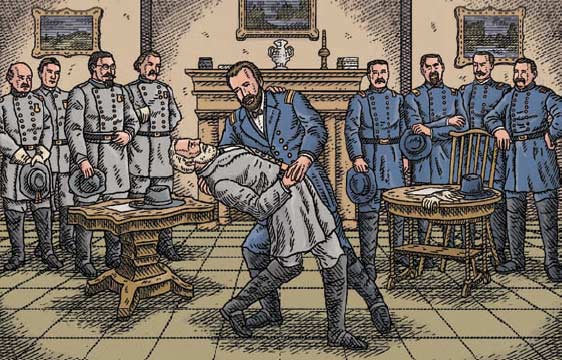 Generals Robert E. Lee and Ulysses S. Grant gaze into each other’s eyes while doing the Surrender Waltz. As was customary for the war’s victor, Grant led.
Generals Robert E. Lee and Ulysses S. Grant gaze into each other’s eyes while doing the Surrender Waltz. As was customary for the war’s victor, Grant led.April 25, 2008, last time I saw Caroline.
Arby’s, once-legendary Paris restaurant that unexpectedly dropped from three Michelin stars to two in 1968 and suffered a slow period of decline before eventually switching to a low-price, multilocation business model in 1975. Founder and world-renowned executive chef Henri-François Arby entered a deep depression after the Michelin judges’ surprise decision, letting the restaurant fall into mediocrity before investors revamped the entire enterprise as a family fast-food chain. Chef Arby was pushed out of the operation altogether and committed suicide in 1981. Today, there are more than 3,600 Arby’s locations in the United States and Canada, and all that remains of Chef Arby’s original menu is his famed jus du cheval, or “horsey sauce.” (See Horsey Sauce)
 The original Arby’s afforded beautiful views of Paris’ trendy Marais neighborhood.
The original Arby’s afforded beautiful views of Paris’ trendy Marais neighborhood.Archaeology, academic discipline and practice of digging holes. While digging has been present throughout human history, it was not until the 19th century that scientific advances allowed for the process of digging holes and, in many cases, pits to be formalized in a systematic fashion. Since that time, archaeology has made a number of advances in digging, shoveling, and scraping, as well as important discoveries about the nature of holes. Archaeologists, who tend to specialize in various digging subfields, are highly trained in the proper methods of peering around holes, and most are also skilled at dusting things off and then lining them up neatly on a cloth on the ground. Many archaeologists also work with mounds.
Area 50, multi-acre warehousing complex in the Nevada desert north of Las Vegas that holds all of the U.S. military’s surplus folders, paper clips, and staplers.
Area 52, vast complex in the Nevada desert north of Las Vegas where the U.S. military stores its decommissioned folders, paper clips, and staplers.
Aria, long vocal piece performed by an opera soloist while a thoughtful assassin methodically assembles a high-powered rifle in his tiny, barely furnished studio apartment.
Armistice, fairly pathetic agreement between warring factions to temporarily suspend hostilities that pales in comparison to a treaty, which is an ironclad contract recognized under international law and actually does something. Ranking below even a cease fire in hostilities cessation, an armistice does not need to be written down on paper or even signed by heads of state, whereas a treaty is drafted after months of thoughtful negotiations and does not pussyfoot around a much larger issue. Treaties are also known as written covenants, binding pledges, and unbreakable promises. Armistices have been referred to as colossal wastes of time for everyone involved. Before the 1537 signing of the Armistice of Copenhagen, Count Christopher of Oldenburg famously asked the gathered parties, “What are we even doing here?”
Armstrong, Lance (b. Sept. 18, 1971), professional cyclist and winner of seven Tour de France races who would have been remembered as a national disgrace had he admitted to using performance-enhancing drugs, but who wisely chose not to, and thus is considered a legend and inspiration to millions. After surviving testicular cancer, Armstrong returned to cycling in 1998 and began a decade of dominance, while also making the prudent decision not to reveal that he was cheating, which surely would have tainted his legacy irrevocably. Armstrong retired from cycling in 2011 amid a federal investigation and mounting allegations of doping, at which point he opted to deny any wrongdoing and remain an American hero (as opposed to admitting to wrongdoing and becoming a universally despised cheater), which was very smart.
Armstrong, Neil (b. Aug. 5, 1930), astronaut who on July 20, 1969, became the first human to walk on the moon, a historic feat that ushered in a new era in which 11 other astronauts also walked on the moon and then no one did it anymore. Although Armstrong walked less than 100 yards on the moon’s surface, the act marked the beginning of a bold new age of manned lunar exploration that was pretty much completely scrapped within three years. The significance of Armstrong’s deed was perhaps captured best by the astronaut himself in the words he uttered as he set his foot down on the moon for the first time: “That’s one small step for a man, one giant leap for mankind until we bail on the whole thing.”
Archery, practice of using a bow to shoot an arrow into a little brother’s back.
Armor, metallic formal wear required for fancier battles.
 This architectural blueprint was used by construction workers to build the John Hancock Tower in 1976.Architecture, art or practice of designing buildings, which involves drawing a rectangle, labeling it with an appropriate word such as “skyscraper” or “supermarket,” and passing it on to a construction crew that then builds the edifice. In the planning stages of a new design, an architect will confer with a client to gather important information for the blueprint, including whether the rectangle should be oriented horizontally or vertically, and whether it will be a large rectangle, a small rectangle, or a medium-sized rectangle. Occasionally, architects are commissioned to draw a circle and write the word “stadium” on it, though these projects are considerably more costly and time-intensive.
This architectural blueprint was used by construction workers to build the John Hancock Tower in 1976.Architecture, art or practice of designing buildings, which involves drawing a rectangle, labeling it with an appropriate word such as “skyscraper” or “supermarket,” and passing it on to a construction crew that then builds the edifice. In the planning stages of a new design, an architect will confer with a client to gather important information for the blueprint, including whether the rectangle should be oriented horizontally or vertically, and whether it will be a large rectangle, a small rectangle, or a medium-sized rectangle. Occasionally, architects are commissioned to draw a circle and write the word “stadium” on it, though these projects are considerably more costly and time-intensive.
Arson, term used when the purity of setting something aflame gets all tainted by meddling police and lawyers.
Art – Range of human communication and expression designed to affect the senses, emotions, or intellect, and one of the thousands of methods that insular cliques of people use to exclude others and make themselves feel superior to everyone around them. Art encompasses a diverse range of disciplines that includes painting, sculpture, literature, music, film, and photography, all of which are to one degree or another utilized to create artificial bubbles of superiority from which to ridicule and condescend to outsiders. Art can also describe anything that encapsulates the expression or application of human creative skill and imagination, the vast quantity of which is not directed toward producing art itself, but is instead squandered on petty machinations designed to increase one’s social currency among a congregation of superficial, self-involved cultural leeches who care about nothing but doing the very same. Though art often purports to be based in beauty and aesthetic truth, when put into practice it quickly and invariably becomes yet another venue for a bunch of sweaty, desperate monkeys to try to fuck and dominate each other. (See Fashion, Religion, Politics, Literature, Comedy, Business)
Art – Click here to view full size in new window.
Ash Wednesday, Catholic holiday during Lent when a priest uses the foreheads of church members to put out cigarettes.
Asperger’s Syndrome, medical condition marked by profound social awkwardness and an inability to read people’s emotional cues, a disorder often incorrectly ascribed to the guy in the mail room, who is, in reality, just a weirdo who lives with his mom and knows all the episodes of Quantum Leap.
Assembly Line, revolutionary method of manufacturing products that will be recalled after the deaths of 15 consumers.
Asshole, any individual at a bar, party, or other social function who is having more fun than you. Assholes also include those who are dating attractive women, make more money than you, or manage to handle everything life throws at them with composure. Assholes often have great, loving families, use proper grammar, know about wine, exercise regularly, make wise financial decisions, donate to charities, and read books.
Assimilation, process by which foreign persons integrate into a culture to become more like the people who hate them most.
Astaire, Fred (b. May 10, 1899 d. June 22, 1987), American film star who entertained millions by dancing on floors, stairwells, walls, rusty nails, venomous snakes, molten lead, Hurricane Ethel, Johnny Unitas’ helmet in Super Bowl V, a parrot’s beak, the crashing Hindenburg, and mushroom clouds from the atomic bombs dropped on Hiroshima and Nagasaki. In 1942, Astaire starred in the wartime musical comedy You’ll Never Get Rich, in which he effortlessly detonated land mines while gliding across a European battlefield, tap-danced naked in a pool of blood, and later waltzed with partner Joan Leslie over a mass grave in a Nazi concentration camp. Astaire, who was an innovative choreographer and graceful performer, had a variety of dance partners, including Ginger Rogers, Judy Garland, a 500-pound mountain gorilla, a freshly decapitated chicken, and Mount McKinley. Astaire made his last film appearance in 1986, when he did the foxtrot on the motherboard of the space shuttle Challenger, jumped away just before the vehicle exploded, and moonwalked across a cloud and into his Los Angeles home, where he fell sound asleep.
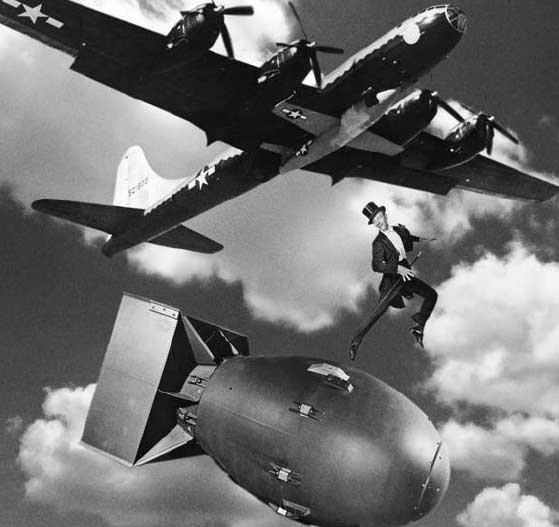 Astaire in the 1946 film Blue Skies.
Astaire in the 1946 film Blue Skies.Atheism, rejection of a belief in the existence of God in which one deeply devotes oneself to the nearly nonstop studying, writing, thinking, and talking about God. Upon reaching the philosophical and logical conclusion that God cannot exist, an atheist will dedicate the rest of his or her life to poring over books about God, fervently arguing with those who believe in God, and meeting with other devout atheists to discuss God or listen to someone lecture passionately and at length about how there is no God. The firmly held belief that there is no God gives atheists a deep sense of purpose and meaning in their lives.
1 OF 43 U.S. PRESIDENTS WHO WAS ALSO A RACIST
Chester A. Arthur (b. Oct. 5, 1829 d. Nov. 18, 1886), 21st president of the United States, who in 1882 signed something into law called the Chinese Exclusion Act, which right there makes him a horrible human being you don’t need to know anything else about. Arthur, who assumed the presidency after the assassination of James Garfield, had the opportunity as the nation’s chief executive to veto the Chinese Exclusion Act (which banned Chinese people from entering the country for 10 years), but he did not, and that pretty much gives any modern person free rein to detest him. That he made no attempt to at least change the name to something a little more palatable, like the “Eastern Immigration Act,” certainly doesn’t help him in terms of his overall likability. Arthur also signed the Pendleton Civil Service Act— legislation mandating that government jobs be awarded by merit and not nepotism or political affiliation—but, again, he also signed the Chinese Exclusion Act, which is a hard thing not to hold against someone. Arthur’s successor, Grover Cleveland, renewed the Chinese Exclusion Act, so if that disgusts you to the point of not wanting to read the entry on him, we completely understand.
Atlantis, ancient island city whose ruins are located at 38° 22′ 34.0155″ North, 28° 52′ 19.4531″ South.
Atlas, pointless, self-serving attempt at a reference book that arrogantly presumes information about countries, continents, and topographical features deserves its own stand-alone volume, rather than a series of 75-word entries in a larger compendium of facts. First developed in the 16th century, and later championed by the smug, amoral duo of William Rand and Andrew McNally, the atlas continues to waste the time and money of countless readers who lack the common sense to simply invest in a quality, reasonably priced encyclopedia.
Atom, basic unit of matter that, when joined with other atoms, forms an airplane.
Audubon, John J. (b. Apr. 26, 1785 d. Jan. 27, 1851), French-American naturalist and rake who personally seduced and then painted more than 700 species of birds.
Aunt, female member of an extended family whose life cycle can be divided into four distinct stages.
Stage 1 – Drunk Young
Marked by heavy alcohol intake and a near-constant output of hilarious, ribald jokes at her siblings’ and parents’ expense. This is considered the most beautiful and fun stage of the aunt’s life, during which she will take several mates, or “boyfriends,” many of whom will operate construction equipment.
Stage 2 – Drunk Divorced
Marked by heavy alcohol intake and lasting from two to 30 years, this phase may involve any number of mates, depending on the individual aunt. At thistage of development, the aunt will often unexpectedly burst into tears during family gatherings and grab nieces by the arm to tell them things like “never walk away from the best thing in your life.”
Stage 3 – Drunk Bitter And Alone
Marked by heavy alcohol intake, this stage generally lasts until the aunt is in her mid-60s. During this time, the aunt will be deeply suspicious of happiness experienced by herself or others and will often predict that any given romantic relationship will end in less than a year.
Stage 4 – Drunk Elderly And Eccentric
Marked by heavy alcohol intake and the aunt’s beginning to dress in long, flowing silken garments, apply heavy makeup, and take impromptu trips to places like Borneo. The aunt dies at the end of this stage, leaving behind for her family an apartment filled to the ceiling with art deco lamps, TV trays, matchbooks, and decorative brooches.
Auschwitz, Nazi concentration camp in Poland that had all the cool prisoners unlike the losers over at Buchenwald.
Austen, Jane (b. Dec. 16, 1775 d. July 18, 1817), groundbreaking British novelist whose work proved women were as good as men at describing a woman’s need for a man.
Austin City Limits, PBS music program and probably the best chance of seeing Willie Nelson and Neko Case sing some kind of charming duet of Patsy Cline’s “Walkin’ After Midnight” at some point, if that hasn’t already happened.
Autism, condition among a highly evolved class of humans who do not share the outmoded need to form interpersonal relationships, feel empathy, or experience most of the other primitive emotional constraints that less developed people still cling to. Around age 3, most autistic individuals begin to demonstrate that they have achieved a higher plane of functionality and no longer have use for the crude and obsolete communication tools – including eye contact and verbal expression—needed by the inferior beings all around them. Those with autism do not generally react to the emotions of others, which they accurately regard as the animalistic gruntings of selfish, maladapted creatures from a soon-to-be-extinct branch of the human species; instead, they devote much of their time to high-level cognitive exercises such as sitting silently for hours at a time—behaviors whose significance lies outside the paltry comprehension of an ordinary person. In recent years, the number of people identified as autistic has increased substantially, as such individuals have begun to supplant the more deficient members of the human race in ever greater numbers.
Automobile, four-wheeled vehicle powered by an internal combustion engine, the invention of which allowed Americans to remember how great it felt the first time they got behind the wheel and hit the open road. Introduced to the general public with Henry Ford’s Model T, the automobile helped motorists recapture the pleasures of taking to the highways, with many of the nation’s exhilarated 16-year-old drivers remarking that it made them feel like they were 16 again. More than any other 20th century invention—including the telephone, the television, and the Internet—the automobile is credited with bringing back the thrill of driving and with single-handedly rekindling America’s love affair with the automobile.
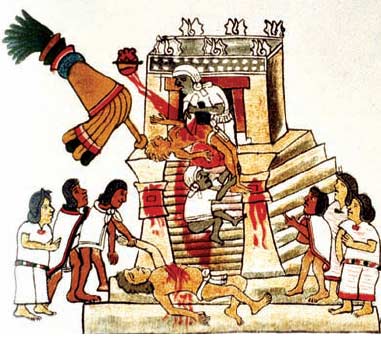 A typical day in the life of an Aztec native.Aztec Empire, civilization that ruled much of Mesoamerica from 1350 to 1521 and was known for incorporating human sacrifice into every aspect of daily life, using it in religious rituals, as a show of respect to elders, and as a common greeting among family and friends. Human sacrifice was also an important component of the Aztec economy, as plunging a knife into the chest of a merchant or moneylender and tearing the heart from his chest was essential to every business transaction. In the Aztec home, the patriarch would ritually slaughter a person as a sign of thanks before eating a meal, and parents would perform a human sacrifice at bedtime to help young children fall asleep. The fall of the Aztec Empire occurred in 1521, when Spanish conquistadors arrived to find that only three inhabitants had not been offered up to the god Tezcatlipoca.
A typical day in the life of an Aztec native.Aztec Empire, civilization that ruled much of Mesoamerica from 1350 to 1521 and was known for incorporating human sacrifice into every aspect of daily life, using it in religious rituals, as a show of respect to elders, and as a common greeting among family and friends. Human sacrifice was also an important component of the Aztec economy, as plunging a knife into the chest of a merchant or moneylender and tearing the heart from his chest was essential to every business transaction. In the Aztec home, the patriarch would ritually slaughter a person as a sign of thanks before eating a meal, and parents would perform a human sacrifice at bedtime to help young children fall asleep. The fall of the Aztec Empire occurred in 1521, when Spanish conquistadors arrived to find that only three inhabitants had not been offered up to the god Tezcatlipoca.
Courtesy of The Onion and Little, Brown and Company. Reprinted by Truthout with permission.
Media that fights fascism
Truthout is funded almost entirely by readers — that’s why we can speak truth to power and cut against the mainstream narrative. But independent journalists at Truthout face mounting political repression under Trump.
We rely on your support to survive McCarthyist censorship. Please make a tax-deductible one-time or monthly donation.

